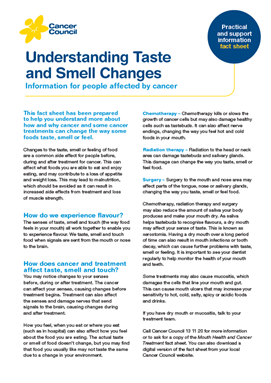- Home
- About Cancer
- Managing side effects
- Taste and smell changes
- How to manage taste, smell and touch changes
How to manage taste, smell and touch changes
There are many ways to manage common changes to taste, smell and touch. Talk to your treatment team for advice. You may also be referred to a dietitian who can develop an eating plan and help you improve your diet and eating experience.
Learn more about how to manage:
Managing general changes
- Taste or smell changes may vary over time and with different treatments. Keep a record of any changes, the time of day, how far from the start or end of your treatment cycle you are, and what food and drink you are having. This will help the treatment team to work out the causes and suggest ways to manage the side effects.
- Keep trying different foods, as your tastes may change. You may not like bitter drinks (e.g. tea, coffee, beer, wine) or sweet foods (e.g. chocolate) even if you liked them before treatment. It is common to prefer savoury foods after treatment.
- If meat tastes unpleasant during treatment, replace it with other protein sources (e.g. cheese, eggs, nuts, dairy foods, seafood, baked beans, lentils or chickpeas).
- Keep your mouth clean and fresh. Clean your teeth with a soft toothbrush after each meal, and regularly rinse your mouth with salt water or the mouthwash suggested by your treatment team.
- Use bamboo cutlery if metal spoons, forks and knives taste metallic.
- Drink through a paper or silicone straw so the taste isn’t as strong. Metal straws may add a metallic taste.
Ways to manage taste changes
| bland |
|
| overpowering |
|
| too salty |
|
| too sweet |
|
| too bitter or metallic |
|
Ways to manage smell changes
| increased sensitivity |
|
| negative connection with treatment |
|
| nausea |
|
| bad taste in your mouth due to smell |
|
Ways to manage changes to touch
| increased sensitivity |
|
| less sensitivity |
|
| food feeling like “cardboard”, “straw” or “sand” |
|
Listen to our podcast on Appetite Loss and Nausea
More resources
Emma McKie, Clinical Dietitian, Peter MacCallum Cancer Centre, VIC; Cecilia Barling, Consumer; Dawn Bedwell 13 11 20 Consultant, Cancer Council Queensland, QLD; Gillian Blanchard, Oncology Nurse Practitioner, Calvary Mater Newcastle, NSW; Dr Karen Taylor, Radiation Oncologist, GenesisCare Radiation Oncology, VIC.
View the Cancer Council NSW editorial policy.
View all publications or call 13 11 20 for free printed copies.
Need to talk?
Support services
Coping with cancer?
Speak to a health professional or to someone who has been there, or find a support group or forum
Cancer Council Online Community
A community forum – a safe place to share stories, get tips and connect with people who understand
Cancer information
Learn more about chemotherapy
Chemotherapy is the use of drugs to kill or slow the growth of cancer cells
What is cancer?
How cancer starts and spreads


